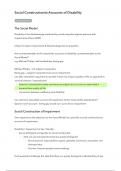Social Constructionist Accounts of Disability
#appliedethics
The Social Model
Disability is the disadvantage produced by social prejudice against persons with
impairments (Oliver 2009)
2 Key Concepts: Impairments & Disadvantage due to prejudice
Are counterexamples to the naturalistic accounts of disability counterexamples to the
Social Model?
e.g. Michael Phelps, Left-handedness, being gay
Michael Phelps - not subject to prejudice
Being gay - subject to prejudice but not an impairment
can alter naturalistic argument to say that it does not ‘impact quality of life’ as opposed to
‘survival chances / reproduction’
however, homophobia exists and many are subject to it to such an extent that it
impacts their quality of life
connection between wellbeing and disability
Can we find a naturalistic account of impairment which meets all the desideratum?
Species-norm account - being gay would turn out to be an impairment
Social Construction of Impairment
One response to the objection to the Social Model is to provide a social constructionist
account of impairment.
Disability / Impairment vs Sex / Gender
Sex as biological and gender as social constructed
what are sex characteristics that are purely biological?
Chromosomes, reporudcfitve organs, genitalia, hormones, secondary ‘sex’
characteristics
Counter: Intersex people (more reading)
Such examples challenge the idea that there is a purely biological understanding of sex.
, ‘If the immutable character of sex is contested, perhaps this construct called ‘sex’ is as
culturally constructed as gender; indeed, perhaps it was always already gender, with the
consequence that the distinction between sex and gender turns out to be no distinction at
all.‘ Judith Butler (1999)
Shelley Tremain claims that ‘impairment’ is as socially constructed as disability and claims
‘impairment has been disability all along’
Howard & Was’ Social Exclusion Model
A person S is disabled in context C, iff
1. S is in some bodily or psychological state x [such that]
2. x is regularly assumed in the ideology in C to involve an impairment: a dysfunctional
bodily state that limits a major life activity, and
3. in the dominant ideology of C, that someone in x has an impairment explains why they can
be appropriately pitied, stigmatised, and excluded from socially valued activities and
statuses.
4. The fact that S is in this state plays a role in S’s systemic disadvantage: that is, (i)–(iii)
actually explains why S is involuntarily excluded from certain valued activities or relegated
to a marginal status along some significant social dimension.
Social construction of impairment by thinking about a social ideology of impairment, and
then on that basis you are subject to prejudice / stigma and that is what makes you
disabled.
Is being gay a disability according to this account?
in a kind of ideology where being gay is regarded as evil or a defect, where one is
impaired
Q: What bodies count as impaired or defective may be a socio-historical issue? Perhaps
we cannot achieve a naturalistic account of impairment
Elisabeth Barnes Critique
there is no bodily element in this account of disability
not just about ideology or ableism
even if ableism did not exist, there would still be bodies that are ‘different’ / ‘atypical’
which may require additional support, treatment or medication





